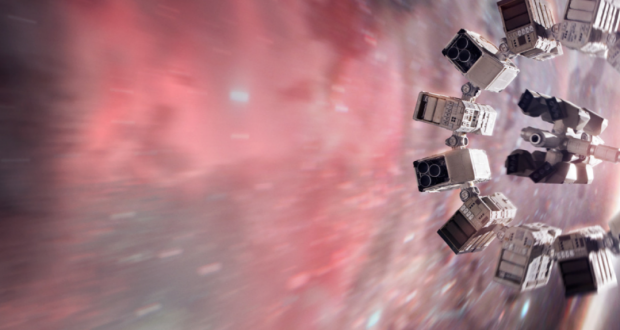The world is dying. Christopher Nolan’s Interstellar is set in a world where crop blight and rapidly changing temperatures has caused the United States to become a dust bowl, and humanity is on the brink of extinction. Space flight has officially been abandoned as wasteful and pointless, so former NASA pilot Cooper (Matthew McConaughey) runs a corn farm (the only thing that grows). But when a “ghost” starts sending messages to Cooper’s daughter Murphy (Mackenzie Foy), they are led to a secret NASA base, and find there is hope for humanity’s survival after all.
Epic in both its scale and ambition, Interstellar is clearly aiming to nestle itself beside 2001: A Space Odyssey as a classic sci-fi masterpiece. It references 2001 visually and thematically, making it a kind of spiritual sequel to that film. Unlike 2001, with its treacherously practical robot antagonist HAL 9000, Interstellar proposes a future in which robotics and technology are actually humanity’s greatest allies. Here they are willing to undertake the self-sacrificial action for the greater good which humans are so often unwilling to carry out.
Interstellar is essentially a film about the tension between personal and communal survival, and what that says about humanity. Later in the film, Cooper is faced with a choice: If he pragmatically completes his mission, he will never see his children again—which feels soulless—but if he turns back to Earth and repairs his broken relationship with his children (who are upset he has left Earth) the whole human race will die out. Should we aspire to the cool, utilitarian way of robots? It might save our species, but it could mean we lose what it means to be human.
Most interestingly for a Christian audience, Interstellar also explores the question of who is responsible for humanity’s survival—is it purely up to us, or is there an alien power (or higher power) involved? There’s plenty to chew on, but it doesn’t quite live up to Christopher Nolan’s previous movies. Ultimately Interstellar feels a little flat and cerebral, and the sense of plausibility which is so carefully cultivated in the first two-thirds of the film is thrown straight out the window towards the end. Still, we are unlikely to get another sci-fi movie as polished as this for many years.
Rohan Salmond
Cross-platform editor
 JourneyOnline
JourneyOnline


